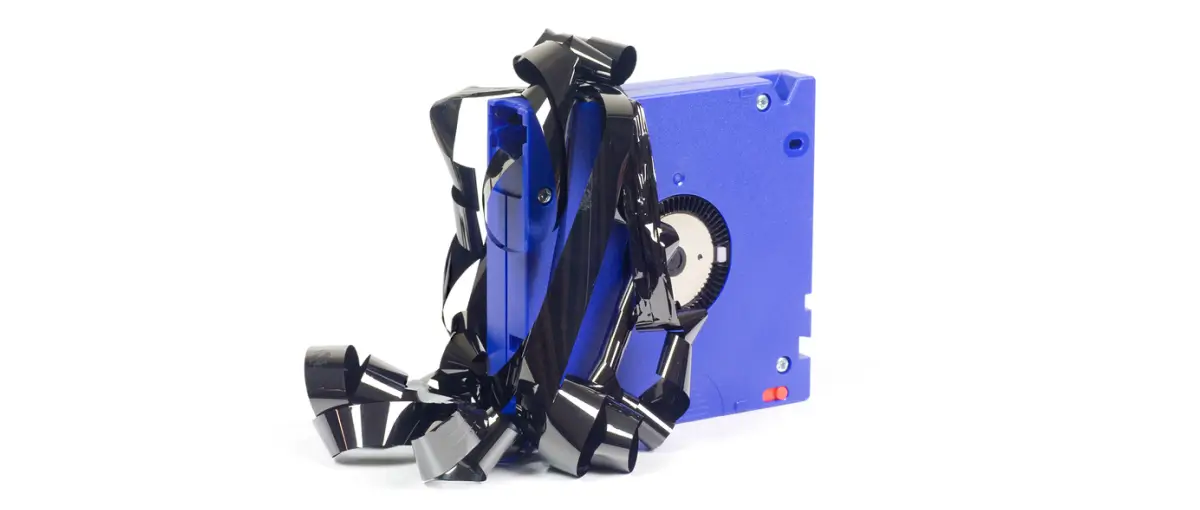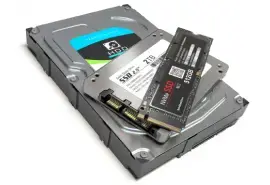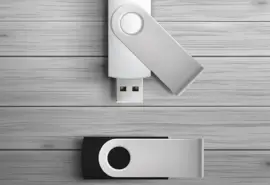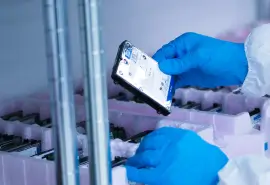To safely store tape cartridges, all businesses should have a dedicated, controlled storage environment with humidity controls. Excessive humidity can seriously damage magnetic media, and data tape cartridges are particularly susceptible to moisture-related damage.
Most of the materials used to make data tapes are hygroscopic, which means that they attract and hold water. When this water evaporates, it leaves behind solids that can damage tapes. Water can also directly weaken some cartridge components, improving the chances of snapped or torn tape. This effect is compounded by excessively high temperatures.
Dryness is just as serious of a problem. Tape cartridges may lose oxide more quickly when stored in extremely dry environments, and a low relative humidity increases the chances of harmful electrostatic discharge. Tape can become brittle when kept in low humidity environments for long periods.
Fortunately, modern tape manufacturers use special manufacturing processes to improve moisture resistance. LTO, SDLT, DDS, DAT and other popular tape formats function well in occasionally humid and dry environments, and seasonal weather changes typically do not pose a serious danger to tape reliability in the short term. Most manufacturers recommend a relative humidity of 20 to 80 percent for basic tape drive operation, and brand-new tapes will rarely malfunction at either end of this range.
The higher the operating environment's temperature, the lower its ideal humidity and vice-versa. For example, if your tape drive is in a room that has a 20 percent relative humidity, the temperature in the room should be towards the top of the manufacturer's stated operating range.
Protecting Data Tape Cartridges from Excessive Humidity
While tape drives can operate effectively in a range of conditions, it is important to take appropriate precautions to maintain a consistent humidity and temperature in any long-term media storage environment.
A relative humidity of around 40 percent is ideal for long-term storage. Check humidity at least once a day, and if humidity changes drastically for any reason, gradually readjust the relative humidity to avoid damaging your tape cartridges. Do not attempt to read your data cartridges for at least a week after any major changes in the relative humidity of the storage environment.
To keep humidity from building up in data tape cartridges, always store your media in protective cases. Keep temperatures consistent--most manufacturers recommend storage temperatures of around 65 degrees Fahrenheit (about 18.34 degrees Celsius).
Dust and Humidity
Many tape users do not realize that airborne particles can trap and transport moisture. Dust can contribute to humidity-related damage, so always keep archival media in a consistently clean environment. Regularly clean your tape drives with manufacturer-approved cleaning tapes, but never touch or attempt to clean the tape of your data cartridges.
While these general tips apply to most popular tapes, you should always check your manufacturer's instructions before adjusting the humidity or temperature of your tape drive's operating environment.
When kept in an appropriate room, many tape cartridge formats can provide reliable archival storage for decades. However, any data cartridge can lose data under the right circumstances. When data loss occurs, you should immediately seek the assistance of a professional tape repair company.
At Secure Data Recovery Services, we specialize in tape data recovery and repair. Our engineers can safely treat damaged LTO, DLT, DDS, DAT, QIC and all other popular tape formats in a certified Class 10 ISO 4 Cleanroom with dedicated temperature and humidity controls.
Time is often a major factor in data cartridge recovery cases. If you cannot access your data and you believe that humidity or dust contamination contributed to cartridge damage, contact Secure Data Recovery Services as soon as possible to discuss your options.







